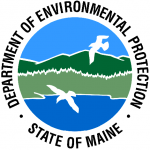Since March 24, 2011 the Maine Department of Environmental Protection (ME DEP) policy has offered an option for management of solvent-contaminated wipes (wipers in ME DEP policy) for generators of hazardous waste. In the absence of a comparable exclusion in USEPA regulations, this state policy held the force of regulations for ME businesses. That changed with the USEPA’s announcement July 23, 2013 of a conditional exclusion for both disposable and reusable solvent-contaminated wipes effective January 31, 2014 (read about the Federal Rule).

These Federal regulations force ME DEP (and all other states without an authorized hazardous waste program) to choose between adopting the new regulations as is or to create its own – possibly more stringent – state regulations. Continuing the management of solvent contaminated wipes as a state “policy” is no longer acceptable for Maine businesses. I was informed by Michael Hudson of ME DEP on March 24, 2014 that Maine is expected to adopt the new Federal rule – as is – into its state regulations some time before July 2015, possibly in 2014. Until then, per Michael Hudson, Maine businesses have two options:
- Comply with the new Federal Rule.
- Continue to comply with the ME DEP policy until the Federal Rule is adopted into state regulations.
Read on for a summary of the ME DEP Policy for Solvent Contaminated Wipers.
Daniels Training Services 815.821.1550 |
What is a wiper?
Wipers covered under this Policy includes: shop towels, rags, and disposable wipers used in commercial and industrial settings, and other non-saturated textiles (e.g., uniforms, floor mats).
Which solvents are included?
Wipers must be contaminated with a solvent that is a listed hazardous waste as a spent organic solvent (F001 through F005) by both USEPA and ME DEP regulations. A wiper that is a hazardous waste solely because it is a characteristic hazardous waste (most likely D001 for Ignitability) may not take advantage of the exclusion under the ME DEP Policy. This contrasts with the Federal Rule which is more broad in its definition of a solvent contaminated wipe as it includes P- & U-listed solvents along with F001-F005, wipes contaminated with listed solvents that only exhibit a characteristic of hazardous waste (D001, D002, D003, & D004-D043), and wipers that are contaminated with a solvent that is not a listed hazardous waste but exhibit solely the characteristic of Ignitability (D001).
The saturation requirement:
Under the ME DEP Policy excluded wipers must be non-saturated. The Policy refers to this as the “one drop” criterion: As long as one drop of solvent flows from a wiper when subjected to hand-wringing or a mechanical compaction method, the wiper is saturated and therefore a hazardous waste. Fortunately, the ME DEP Policy allows a business to achieve the one-drop criterion through hand-wringing or mechanical compaction method without requiring a permit for treatment of a hazardous waste. Of course, intentional air-drying to achieve “one-drop” is not acceptable. Collected solvent may be reused on-site or must be managed as a hazardous waste. The ME DEP Policy is more strict than the new Federal Rule on this point as well. The new USEPA exclusion allows for the accumulation of liquid solvent with wipes as long as the accumulation container prevents a spill and the free liquid is separated from the solvent wipes at the time the wipes are sent off-site for laundering or disposal.
Like this article? Subscribe to my Monthly Newsletter No marketing emails! |
What types of laundering facilities may be used?
It is the responsibility of the generator to ensure the industrial launderer used to clean non-saturated wipers discharges to a Publicly Owned Treatment Works (POTW) with an approved pretreatment program as defined by ME DEP regulations. On-site laundering must be discharged under a Maine Pollution Discharge Elimination System (MPDES) permit that specifically recognizes the operation of the non-saturated wipers laundering operation. This is similar to the USEPA Rule though it allows for the dry-cleaning of reusable wipes.
Other differences between the ME DEP Policy and the new Federal Rule:
- Most significantly, the Federal Rule allows for an exclusion from management as a hazardous waste (they remain a solid waste) for disposable solvent contaminated wipes (cannot be contaminated with Trichloroethylene). Besides other on-site management requirements, disposable wipes must be sent for disposal to a municipal solid waste landfill or a MSW Combuster.
- The Federal Rule has specific requirements for the on-site management of the wipes, including but not limited to:

The ME DEP enforces the RCRA hazardous waste program in Maine - Closed container.
- Labeling
- On-site accumulation time limit.
- Recordkeeping
Make your decision, decide which rule/policy to follow, and be certain to comply with the applicable requirements. If you are subject to this regulation then you also require the Federal and state training that I provide. Please don’t hesitate to contact me with any questions you may have about the management of hazardous waste in Maine.
View the ME DEP March 24, 2011 Policy for Solvent Contaminated Wipers

